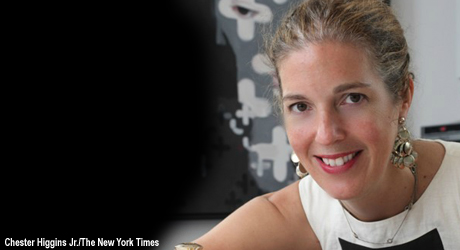Distinguished Neurobiologist Leslie Vosshall to Discuss Drive Mechanisms that Control Feeding and Sex at MBL Friday Evening Lecture, August 10

FOR IMMEDIATE RELEASE: Tuesday, August 07, 2012
Contact: Gina Hebert, Senior Publicist/Development Communications, Marine Biological Laboratory, (508) 289-7725, ghebert@mbl.edu
MBL, Woods Hole, MA – The biological drive to eat and have sex is important for all sexually reproducing species. These drives, however, must be carefully controlled for animals—including humans—to function normally. Renowned molecular neurobiologist Dr. Leslie B. Vosshall will discuss her research aimed at understanding the drive mechanisms that control feeding and sex at the next MBL (Marine Biological Laboratory) Friday Evening Lecture on Friday, August 10. The lecture, titled “Food and Sex: The Neurogenetics of Innate Behavior,” will be held at 8:00 PM in the MBL's Lillie Auditorium, 7 MBL Street, Woods Hole. This Friday Evening Lecture, named The Joshua Lederberg Lecture, is sponsored by The Ellison Medical Foundation and is free and open to the public.

The sensations of hunger and satiety ensure that animals eat at appropriate times and avoid either undereating or overeating. The same concept of hunger and satiety can apply to sex drive. Dr. Vosshall’s laboratory is interested in how olfactory signals in the environment signal food, danger, or mating opportunities, and how those signals modulate animal behavior. She works with humans as well as with Drosophila melanogaster flies and Aedes aegypti mosquitoes, the vector for dangerous infectious diseases such as Dengue fever and yellow fever. Dr. Vosshall uses the fly Drosophila melanogaster to study sex drive and has identified a small number of neurons that both control male fly sex drive and the precise duration of copulation. She will discuss recent advances in both research areas at her MBL Friday Evening Lecture.
Dr. Vosshall is the Robin Chemers Neustein Professor at The Rockefeller University and a Howard Hughes Medical Institute Investigator. She received an A.B. from Columbia University and a Ph.D. from The Rockefeller University. Following postdoctoral training, she returned to Rockefeller in 2000 as an assistant professor. She was promoted to associate professor in 2006 and was named Robin Chemers Neustein Professor in 2010. She was appointed a Howard Hughes Medical Institute investigator in 2008. Dr. Vosshall has been a faculty member of the MBL Neurobiology and Neural Systems and Behavior courses. Her awards include a Gill Young Investigator Award in 2011, a Dart/NYU biotech award in 2010, a Lawrence C. Katz Prize from Duke University in 2009, and a Blavatnik Award for Young Scientists in 2007. In 2005 she received the New York City Mayor’s Award for Excellence in Science and Technology and the Irma T. Hirschl/Monique Weill-Caulier Trust Research Award.
The final lecture in the 2012 Friday Evening Lecture Series will be held on August 17. Bonnie L. Bassler of Princeton University and the Howard Hughes Medical Institute will present "How Bacteria Talk To Each Other.” For more information, visit mbl.edu/FEL
—### —
The Marine Biological Laboratory (MBL) is dedicated to scientific discovery and improving the human condition through research and education in biology, biomedicine, and environmental science. Founded in 1888 in Woods Hole, Massachusetts, the MBL is an independent, nonprofit corporation.